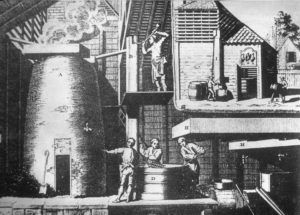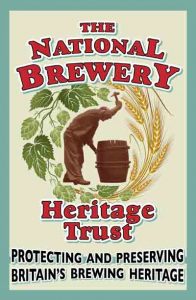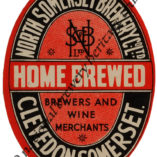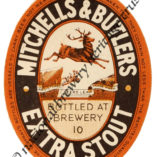
We must protect and preserve our brewing heritage says Harry White.
Brewing heritage embraces the history of brewing as well as its traditions, perhaps adding a whiff of nostalgia for times past. But, I believe heritage also implies a sense of value – a feeling that over the centuries beer and brewing have made a positive contribution to our development as a society, and have left a legacy.
I believe our brewing heritage is a story not only worth telling, but also documenting and preserving, so that it can be passed on to future generations.
Beer brewing did not originate in the UK – we have to go back to Mesopotamia (modern day Iraq) somewhere between 3,000 and 2,000 BC for that. However, the Romans relate that brewing was already being practiced in Britain when they arrived, and the first “pubs” or ale–houses can be traced back to Anglo –Saxon times.
The “Mistery” (or Gild) of London Brewers was confirmed by Royal Charter in 1319. However, the first brewing on a large scale can be traced back to monasteries. These spread across the country following the introduction of Christianity, and they all included a brewery to provide refreshment for monks and visitors alike. Moreover, it was the gap left by the dissolution of the monasteries in the mid–1500’s which acted as a stimulus for the further development of the public house – that uniquely British institution, admired the world over. (As an aside, what better indicator is there than pub signs of the passions and loyalties, activities and idiosyncrasies of the British public through the ages – a legacy in their own right).
So how and why is it that, since the earliest of times, beer and brewing have played such an intrinsic part in the British way of life? Beer is still often referred to as our national drink, and is capable of arousing feelings and passions in a way that neither tea nor coffee (and nowadays wine) ever will. Looking into the reasons for this, a number of factors emerge which start to give some substance and a rationale for what I believe constitutes our brewing heritage. I do not pretend that what follows is a definitive list, but it’s a start:
- First and foremost, beer is a primary product of agriculture; moreover its raw materials are all home-grown. Indeed, the quality of both UK malting barley and UK hops are renowned the world over; both are traded internationally and have their own thriving export markets. So, from the earliest of times, the brewing industry has been a significant contributor to the UK’s farming economy, which in its turn, over the centuries has lain at the heart of the country’s economy.
- For centuries bread and ale (as opposed to water) were considered essential constituents of the British diet – and were officially recognised as such as far back as 1266, in the Assize of Bread and Ale, which established a system of price control for both. A key reason for ale being preferred to water is that, irrespective of the quality of the water used for brewing, the very nature of the brewing process (in particular the boiling of the wort) results in a beverage not only free from any human pathogens, but also incapable of supporting their growth. Even today this is an important (though largely unrecognised) feature of beer, but it was of particular relevance (although again unrecognised) in eras when water supplies were at best unreliable, and at worse a major source and transmitter of infectious diseases. Milk, another historical alternative to beer, can also be a virulent source of infection if not properly treated.
- In terms of its nutritional value, beer provides a source of vitamins, minerals, dietary fibre, and antioxidants. However, whilst beer has always been a safe drink, a major reason for its “safeness” – its alcohol content – can result in a loosening of some of the inhibitions that normally constrain people within society. It is as much for this reason as any other that, since the earliest of times brewing seems to have provoked two responses from governments – legislation and taxation – to the extent that both the production of beer and its retailing have attracted the attention of the regulators throughout the ages.
- Beer was first taxed as far back as 1188, as part of the so-called “Saladin tithe” to help finance the Crusades, but the first taxes directed specifically at beer weren’t introduced until the mid-1600s, initially to help fund another conflict – the civil war (both sides). However, the end of the war did not see an end to the tax and, in one form or another, beer duty has remained (and steadily increased) ever since. Perhaps in part this has been as a salve to the social conscience of successive governments, arising from the consequences of excessive beer consumption, but mainly it has been because of the significant contribution beer duty makes to the exchequer’s purse – currently in excess of £3 billion pounds annually from a total production volume of ~ 25 million barrels!
- Brewing was very much an empirical process until mid-way through the 18th century, when technical advances, in particular the introduction of the hydrometer and thermometer, enabled far greater control of the brewing process. The development of the steam engine also allowed brewers to mechanise and scale-up many aspects of brewery operations.
- But it was the studies on beer (and OK wine) by Louis Pasteur in the late 19th century which were truly to revolutionise our understanding of the brewing process (as well as create two entirely new scientific disciplines: microbiology and biochemistry). Pasteur was the first to demonstrate that yeast was a living organism, and that it was yeast which was responsible for converting sugars into alcohol. It was the ramifications of this, together with a better understanding of how starch is converted to sugars during malting and mashing, combined with the introduction of refrigeration, which enabled brewing to increase in volume and complexity and eventually achieve the scale of operations seen today.
- However, it is the public house which the majority of us associate with beer and brewing. It is the evolution of the pub and the special role it has played in our society and culture over the centuries, which is a key reason the British feel so passionate about beer. The origins of today’s public house can be traced back either to medieval ale houses, inns (which originally catered mainly for travellers) or taverns, which date back to Roman times. All have occupied their own particular niche and played their part in providing a focal point for communities to meet and socialise, as well as enjoy a glass or two of beer.
So, our brewing heritage extends back a long way, and has many facets: nutritional, economic, social and technical. Is it a subject worth documenting and preserving for future generations? Yes, I think so, if only because it has been (and still is) intimately related to our development as a society and as a nation. Beer is not unique to the UK, but the way in which we have enjoyed it, and integrated it within our way of life and communities, certainly is. And it’s a story well worth telling (preferably over a pint or two).





